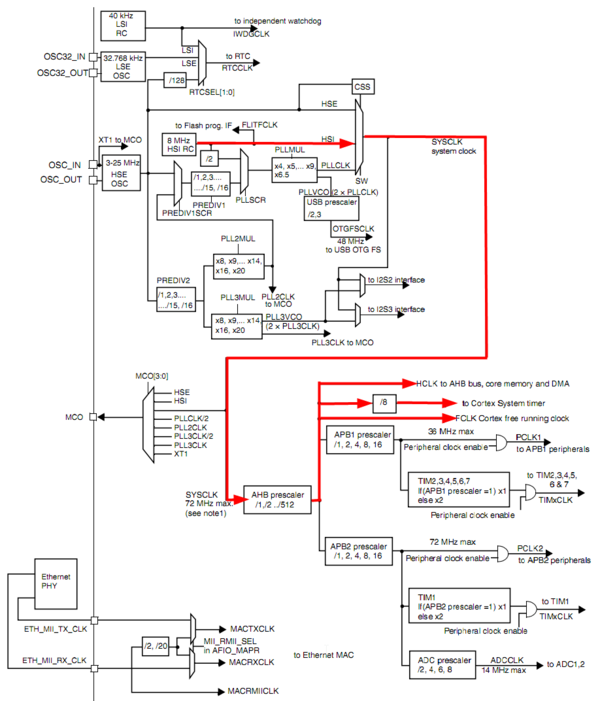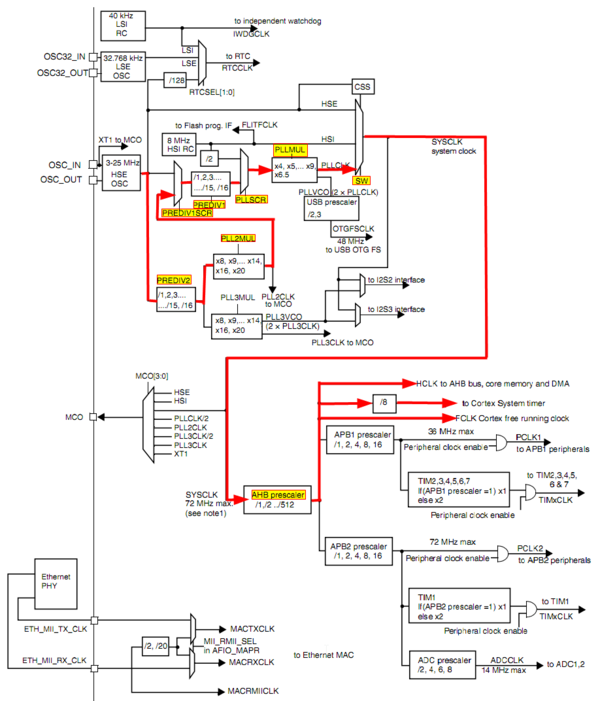Difference between revisions of "STM32F107VC/RCC/Clock Modes example"
From Teknologisk videncenter
< STM32F107VC | RCC
m (→Configuring Clock mode 5) |
|
(No difference)
| |
Latest revision as of 14:16, 27 January 2012
Clock mode 1
Configuring clock mode 1
If the controller is using the HSE clock, and you want to shift to HSI direct clocking.
/* sub rcc_clockmode1()
abstract: Select default as System Clock (HSI 8 Mhz)
input...: -
output..: -
limits..: No errorcheck performed
*********************************************
See: http://mars.tekkom.dk/mediawiki/index.php/STM32F107VC/RSS/Clock_Paths
http://mars.tekkom.dk/mediawiki/index.php/STM32F107VC/RSS
*********************************************
Step 1: Enabling the HSI clock - RCC_CR bit (If not enabled)
HSION = 1 HSI : oscillator on
Step 2: Waiting until HSI clock is ready an can be used as Clock Source
RCC_CR bit HSIRDY = 0 : Oscillator Not Ready
RCC_CR bit HSIRDY = 1 : Oscillator Ready
Step 3: Select HSI in SW[1:0] as Clock Source
RCC_CFGR bits SW[1:0] = 00 : HSI selected
Step 4: Select AHB prescaler=1
RCC_CFGR bits HPRE[3:0] = 0000
Step 5: Setting FLASH wait states FLASH_ACR bits LATENCY[2:0] to 0 Wáit States(section 3.3)
LATECY[2:0] = 000 - Zero wait state. ( 0 Hz < SYSCLK <= 24 Mhz)
LATECY[2:0] = 001 - One wait state. (24 MHz < SYSCLK <= 48 Mhz)
LATECY[2:0] = 010 - Two wait state. (48 MHz < SYSCLK <= 72 Mhz)
Step 6: Disabling HSE Clock- RCC_CR bit
HSEON = 0 : oscillator off
*/
void rcc_clockmode1( void ) {
// Step 1 - Enabling the HSI clock - If not enabled and ready
if ( (RCC->CR & RCC_CR_HSIRDY) == 0) {
RCC->CR |= RCC_CR_HSION; // HSION=1
//Step 2 - Waiting until HSI clock is ready
while ((RCC->CR & RCC_CR_HSIRDY) == 0) {}; // Wait HSIRDY = 1
}
//Step 3: Select HSI in SW[1:0] as Clock Source
// Take care. SW[1:0] Select the clock source
RCC->CFGR &= 0xfffffffc;
//Step 4: Select AHB prescaler=1
RCC->CFGR &= 0xffffff0f; // HPRE[3:0] = 0000
//Step 5: Setting FLASH wait states FLASH_ACR bits LATENCY[2:0] to 0 Wáit
FLASH->ACR &= 0xfffffff8; //LATENCY[2:0] = 000
//Step 6: Disabling HSE Clock- RCC_CR bit
RCC->CR &= ~RCC_CR_HSEON;
}
Clock mode 5
Configuring Clock mode 5
/* sub rcc_clockmode5()
abstract: Select HSE as System Clock with,
Crystal = 25 MHz
SYSCLK = 72 MHz
FCLK = 72 MHz
OTGFSCLK= 48 MHz (USB)
input...: -
output..: -
limits..: No errorcheck performed
*********************************************
See: http://mars.tekkom.dk/mediawiki/index.php/STM32F107VC/RSS/Clock_Paths
http://mars.tekkom.dk/mediawiki/index.php/STM32F107VC/RSS
*********************************************
To select the frequencies 72 MHz as SYSCLK from 25 MHz Crystal the
following calculation is necesary 25 MHz / 5 * 16 / 10 * 9 = 72 MHz
PREDIV2 - Divide by 5
PLL2MUL - Multiply by 16
PREDIV1 - Divide by 10
PLLMUL - Multiply by 9
Step 0: HSEBYP default = 0 (Using Crystral = default)
Step 1: Shift to Clockmode=1 (Freeing the Clock Path for programming)
Step 2: Enabling the HSE clock - RCC_CR bit
HSION = 1 HSE : oscillator on
Step 3: Waiting until HSE clock is ready an can be used as Clock Source
RCC_CR bit HSERDY = 0 : Oscillator Not Ready
RCC_CR bit HSERDY = 1 : Oscillator Ready
Step 4: Select RCC_CFGR2 PREDIV2[3:0] divide by 5 = 0100
Step 5: Disable RCC_CR PLL2ON = Disable (Shut down PLL2MUL)
Step 6: Select RCC_CFGR2 PLL2MUL[3:0] multiply by 16 = 1110
Step 7: Enable RCC_CR PLL2ON = Enable (Start pll2MUL after programmed)
Step 8: Wait for PLL2MUL to lock RCC_CR bit PLL2RDY = 1
Step 9: Select PLL2MUL as PREDIV1SRC - RCC_CFGR2 bit PREDIV1SRC = 1
Step 10: Select RCC_CFGR2 PREDIV1[3:0] divide by 10 = 1001
Step 11: Select PREDIV1 as PLLSRC - RCC_CFGR bit PLLSRC = 1
Step 12: Disable RCC_CR bit PLLON = 0
Step 13: Select RCC_CFGR PLLMUL[3:0] multiply by 9 = 0111
Step 14: Enable RCC_CR bit PLLON = 1
Step 15: Wait for PLLMUL to lock RCC_CR bit PLLRDY = 1
Step 16: USB Prescaler divide by 3 ( 72 Mhz * 2 / 3 ) = 48 MHz
RCC_CFGR bit OTGFSPRE = 0
Step 17: Select AHB prescaler=1 - RCC_CFGR bits HPRE[3:0] = 0000
Step 18: Enable prefetch FLASH_ACR bit PRFTBE = 1
Step 19: Setting FLASH wait states FLASH_ACR bits LATENCY[2:0] to 2 Wáit States(section 3.3)
LATECY[2:0] = 000 - Zero wait state. ( 0 Hz < SYSCLK <= 24 Mhz)
LATECY[2:0] = 001 - One wait state. (24 MHz < SYSCLK <= 48 Mhz)
LATECY[2:0] = 010 - Two wait state. (48 MHz < SYSCLK <= 72 Mhz)
Step 20: RCC_CFGR bits PPRE1[2:0] = 100 -APB1 Prescaler divide by 2 = 36 MHz
Step 21: RCC_CFGR bits ADCPRE[1:0] = 10 ADC-prescaler divide by 6 72 MHz / 6 = 12 MHz
Step 22: Select PLLCLK in SW[1:0] as Clock Source
RCC_CR SW[1:0] = 10
Step 23: Disabling HSI Clock- RCC_CR bit
HSION = 0 : oscillator off
RCC_CFGR bits SW[1:0] = 00 : HSI selected
*/
void rcc_clockmode5( void ) {
int i;
//Step 1: Shift to Clockmode=1
rcc_clockmode1();
// Step 2 - Enabling the HSE clock
RCC->CR |= RCC_CR_HSEON; // HSEON=1
//Step 3 - Waiting until HSE clock is ready
while ((RCC->CR & RCC_CR_HSERDY) == 0) {}; // Wait HSERDY = 1
//Step 4: Select RCC_CFGR2 PREDIV2[3:0] divide by 5 = 0100 (bits[7:4])
RCC->CFGR2 |= 0x00000040; // Setting bit x1xx
RCC->CFGR2 &= 0xffffff4f; // Resetting bit 0x00
//Step 5: Disable RCC_CR PLL2ON = Disable (Shut down PLL2MUL)
RCC->CR &= ~( 1 << 26 ); // Resetting bit 26 disabling PPL2MUL
//Step 6: Select RCC_CFGR2 PLL2MUL[3:0] multiply by 16 = 1110 (bits[11:8])
RCC->CFGR2 |= 0x00000e00; // Setting bits 111x
RCC->CFGR2 &= 0xfffffeff; // Resetting bit xxx0
//Step 7: Enable RCC_CR PLL2ON = Enable (Start pll2MUL after programmed)
RCC->CR |= 1 << 26 ; // Setting bit 26 enabling PPL2MUL
//Step 8: Wait for PLL2MUL to lock RCC_CR bit PLL2RDY = 1
while ((RCC->CR & RCC_CR_PLL2RDY) == 0) {}; // Wait PLL2RDY = 1
//Step 9: Select PLL2MUL as PREDIV1SRC - RCC_CFGR2 bit PREDIV1SRC = 1
RCC->CFGR2 |= 1 << 16; // Setting bit 16 selecting PLL2MUL
//Step 10: Select RCC_CFGR2 PREDIV1[3:0] divide by 10 = 1001 (bits[3:0])
RCC->CFGR2 |= 0x00000009; // Setting bits 1xx1
RCC->CFGR2 &= 0xfffffff9; // Resetting bit x00x
//Step 11: Select PREDIV1 as PLLSRC - RCC_CFGR bit PLLSRC = 1
RCC->CFGR |= RCC_CFGR_PLLSRC;
//Step 12: Disable RCC_CR bit PLLON = 0
RCC->CR &= ~( 1 << 24 ); // Resetting bit 24 disabling PPLMUL
//Step 13: Select RCC_CFGR PLLMUL[3:0] multiply by 9 = 0111 (bits[21:18])
RCC->CFGR &= ~( 1 << 21 ); // Bit 21 = 0
RCC->CFGR |= 1 << 20; // bit 20 = 1
RCC->CFGR |= 1 << 19; // bit 19 = 1
RCC->CFGR |= 1 << 18; // bit 18 = 1
//Step 14: Enable RCC_CR bit PLLON = 1
RCC->CR |= 1 << 24 ; // Setting bit 24 enabling PPLMUL
//Step 15: Wait for PLLMUL to lock RCC_CR bit PLLRDY = 1
while ((RCC->CR & RCC_CR_PLL1RDY) == 0) {}; // Wait PLL1RDY = 1
//Step 16: USB Prescaler divide by 3 ( 72 Mhz * 2 / 3 ) = 48 MHz
RCC->CFGR &= ~(1 << 22); //Resetting OTGFSPRE selects divide by 3
//Step 17: Select AHB prescaler=1 - RCC_CFGR bits HPRE[3:0] = 0000 (bits[7:4])
RCC->CFGR2 &= 0xffffff0f; // Resetting bit 0000
//Step 18: Enable prefetch FLASH_ACR bit PRFTBE = 1
FLASH->ACR |= 1 << 4;
//Step 19: Setting FLASH wait states FLASH_ACR bits LATENCY[2:0] to 2 Wáit States(section 3.3)
FLASH->ACR |= 0x00000002;
FLASH->ACR &= 0xfffffffa;
for(i=0;i < 100000;i++);
//Step 20: RCC_CFGR bits PPRE1[2:0] = 100 -APB1 Prescaler divide by 2 = 36 MHz
rcc_cfgr( 0x00000300, 0 ); //Set PPRE1[1:0] = 0
rcc_cfgr( 0x00000400, 1 ); //Set PPRE1[2] = 1
//Step 21: RCC_CFGR bits PPRE1[2:0] = 100 -APB1 Prescaler divide by 2 = 36 MHz
rcc_cfgr( 1 << 14, 0 ); //Set ADCPRE[0] = 0
rcc_cfgr( 1 << 15, 1 ); //Set ADCPRE[1] = 1
//Step 22: Select PLLCLK in SW[1:0] as Clock Source
RCC->CFGR |= RCC_CFGR_PLLON;
//Step 23 - Disable HSI
RCC->CR &= ~RCC_CR_HSION;
}
}

